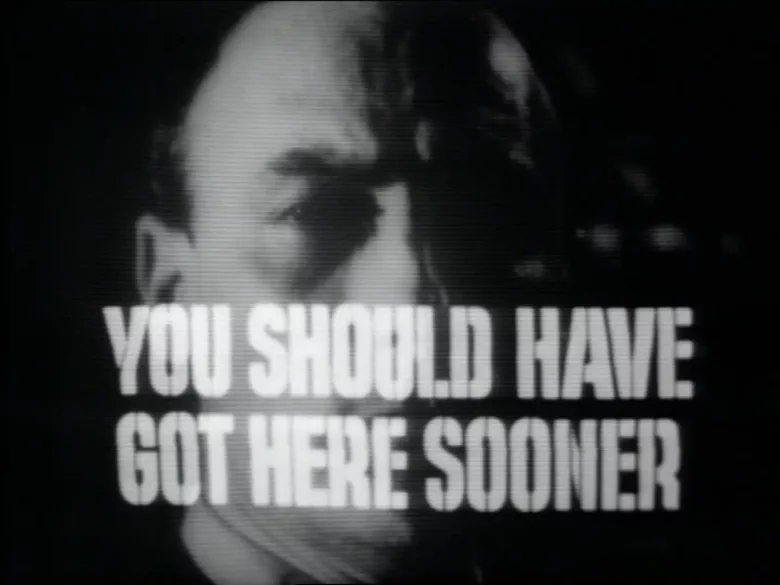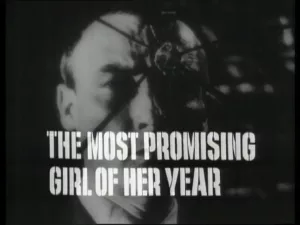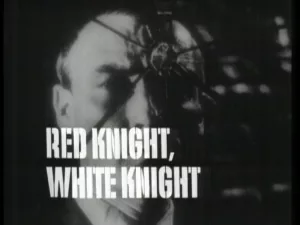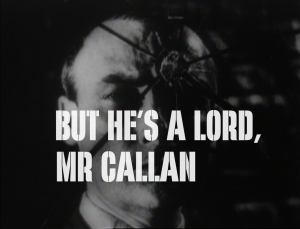To stick with the plot of You Should Have Got Here Sooner, we have to ignore the insane coincidence that Lonely just happened to burgle a flat during the handful of nights that Meres is using it as a safehouse with an escaped spy holed up there. If Lonely can get in, you do worry about the state of national security. Lonely saw the spy, Pollock (Jon Laurimore), so Meres sends a goon after him, and Lonely’s subsequent beating draws Callan in to investigate the man in the flat. Pollock was a scientist who had been sharing secrets with the Russians and disappeared with a devastating new chemical formula, but he was caught by none other than Callan. Now freed, he believes Meres is working for the Russians so he can finally lead them to the formula.
Big chap, short hair, grey eyes
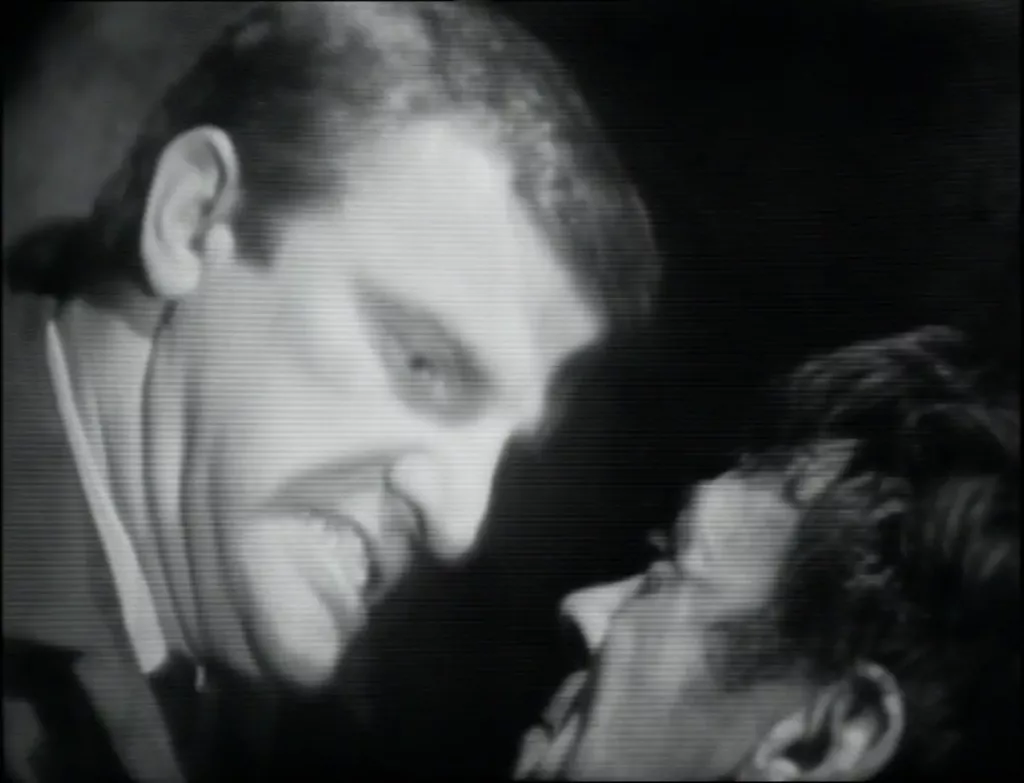
The sound and lighting of the pre-title scene is great and highly effective. A storm is blowing and Lonely’s gaff is in semi-darkness, with flashes of lightning and thunder rumbling. It adds to the atmosphere as we soon realise he has good reason to be scared of the imposing figure who shouldn’t be there. There are good close-ups that show Lonely in proper pain as Loder (Derek Newark) lays into him. Derek really does have an ideal henchman’s face and build. Callan banging on the door is a sudden but welcome jump, causing Loder to scarper. Once Lonely has staggered over to open the door, rain is pouring down on Callan, helping to deliver this studio-whipped-up storm.
I like how quickly that scene’s tension is dissipated after the title sequence, with humour sprinkled in Lonely and Callan’s conversation. Once Callan has cleaned Lonely up they begin chatting about Lonely’s activities that evening: “You been thieving again?” “Well, course I have. It’s my living,” answers Lonely, with an air of ‘Is the pope Catholic?’
But Lonely is sure the bloke who hit him wasn’t the flat’s owner. Callan asks where the illicit goods are and Lonely reveals, slightly awkwardly, slightly reluctantly, that they’re at his auntie’s. “She still fencing for you?” Callan asks. “Just a bit – on the side. She’s semi-retired since Uncle died!” cries Lonely, in a tone that suggests his auntie is merely taking in the occasional lodger without telling the taxman.
Their exchange varies slightly from the dialogue in the script, showing how the actors shaped it in rehearsals. Some lines are shortened or altered to fit the characters’ speech rhythms better.
The changes to the lines about Lonely’s auntie add a couple of things. Callan’s original line is, “She fencing for you?” but with “still” added we now know that Callan is familiar with Lonely’s auntie – or at least what she does. It brings the two a little closer – important in an episode where the story emerges from Callan looking out for Lonely. Lonely’s original reply is, “Just a bit like. On the side. She’s sort of part-time since me uncle died.” But Lonely’s tone on screen doesn’t work with this wording, and the changed line enables a more humorous emphasis, with Callan even smiling at it. It’s one element that brings a lightness to this scene, and adds to their friendship.
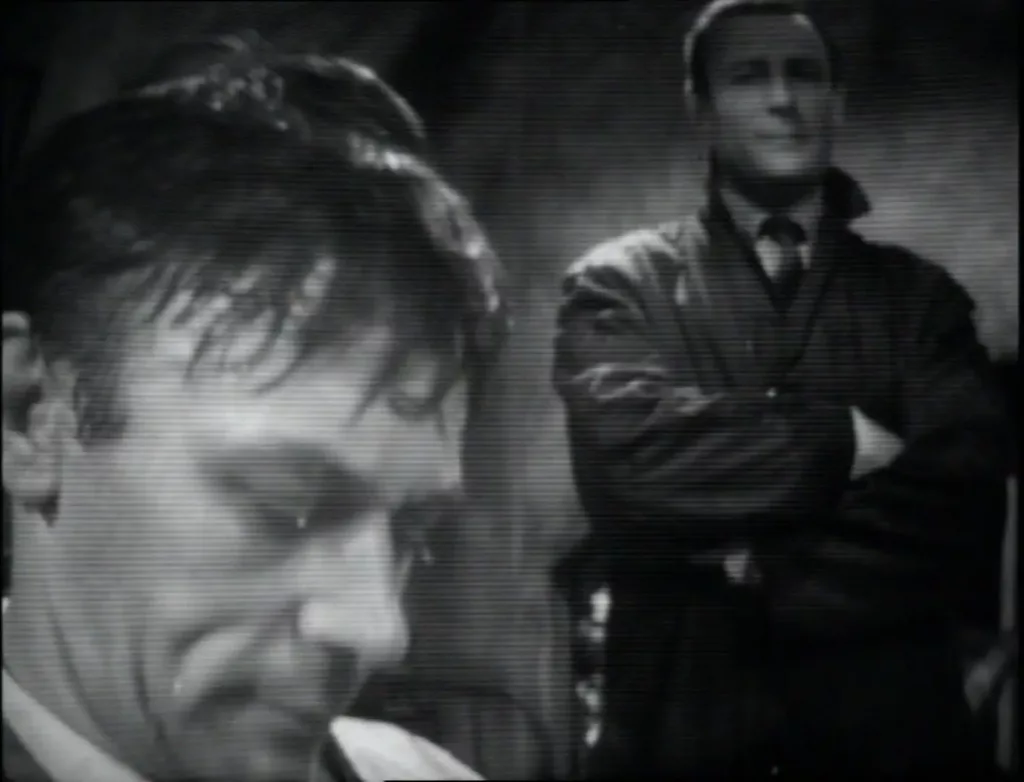
There’s some nice, interesting direction in this scene (although the camerawork struggles to manage it all), starting with a medium shot of them both through Lonely’s open shelving unit. The camera then moves to the left to come around the unit to Lonely and Callan. As Lonely sits and tends to his battering, Callan wanders about, inspecting the flat. The camera settles into a two-shot with Lonely in a close up in the foreground and Callan in the background, sometimes standing, sometimes continuing to move around. It means we’re closer up for Russell Hunter’s many great expressions.
Where forth Mr Tucker?
Callan goes to investigate the flat Lonely had broken into, posing as a busybody from Inland Revenue. The stairwell scenes are on telecine, and I do wonder whether they simply grabbed a free area at Teddington Studios.
This is the first of two pretend identities for Callan in You Should Have Got Here Sooner, and he seems to really enjoy these acting roles. It’s the opportunity for him to posh up a tad and exert a little bit of power over other people who don’t like being told what to do. He dons a bowler hat and introduces himself to the flats’ porter as “Pomfret. J.A. Pomfret” – we still have to wait until next series for Callan to start using his regular Mr Tucker nom de guerre. He adopts an indignant tone as the porter tries to walk away from him, calling out, “We haven’t quite finished, you know.”
Callan’s second acting job comes when visiting the Lyalls as he reprises a role as a Special Branch officer. He’s swapped his bowler for a trilby and it does seem to suit the part. Interestingly, he uses his own name – presumably because he did so when he originally met the Lyalls several years before. He gets one over on Mrs Lyall’s prickly manner by correcting her when she addresses him as “Sergeant”, proudly saying, “Inspector now, ma’am.”
Callan’s voiceovers
Lonely recognises the man in the flat as the escapee on the front of Callan’s newspaper (what a coincidence!) so they then know he’s Pollock. The wallet Lonely nicked contained an address in Sussex, so Callan decides to check it out. After spending time in Lonely’s grotty bedsit and Callan’s less grim but very basic flat, the Lyall’s house in Sussex seems particularly lush, even just from the outside. It’s down a quiet, tree-lined road of bloody big houses (actually Darby Gardens in Sudbury-on-Thames).
We get one of Callan’s (final) voiceovers, admiring the house, and spotting Toby Meres emerging from it.
CALLAN: Good god, it’s dear old Toby. What an extra-ordinary coincidence. Yeah, you’d beat up a smelly little burglar, wouldn’t you, Meres? Especially a mate of mine.
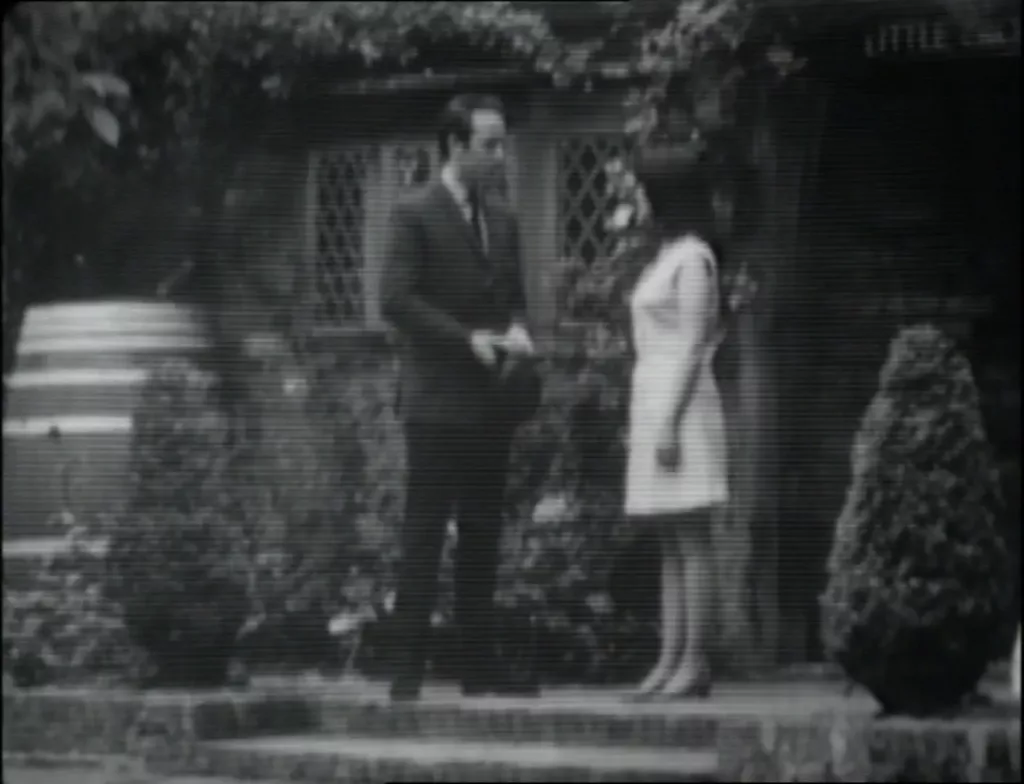
It’s one of the few times where I feel Callan’s inner dialogue doesn’t add a lot – we know that Meres is just the sort of person to order a beating of Lonely, and the audience actually already knows that Meres was behind it. The one thing it does show us is that Callan’s also clocked Sue Lyall (Pinkie Johnstone), and remembers her as Pollock’s girlfriend.
It’s the last episode with his inner monologue. I really like this aspect of Callan, but I’m more conscious of its use in this episode and how much we need it because Callan works alone. From next series Lonely’s role will grow and Meres and Callan will work together occasionally, so Callan will have people he can talk to about a job, removing the main need for the voiceover.
The downside of losing the inner monologue is that from now on we only get to hear what he’s willing to say to others. Callan isn’t a cocky macho man, but he is sometimes bricking it on the inside while looking pretty calm on the outside. In later series, I miss us being privy to that interiority that has, from early on, shown us just how human Callan is and why a part of him never truly belongs in the Section.
Life with the Lyalls
I find Mrs Lyall easy to dislike. Sue tries to push her fussing away, saying, “Don’t suffocate me,” and yet that’s exactly what it feels like throughout the story. Sue is in her late 20s, but her mother seems to want to wrap her in cotton wool. This is a period when many women her age would have moved out to rent somewhere with friends, yet she seems trapped with her mother, having to sneak out to Communist Party meetings. She “wouldn’t let” Sue write to Pollock in prison.
It’s been several years since Pollock was imprisoned yet Sue clearly hasn’t moved on at all. It’s far easier to feel sympathy for him and her because they’re both somewhat naïve idealists.
My favourite scene with the Lyalls is Mrs Lyall (Anne Blake) handing Sue a glass of sherry, then chastising her for smoking, “I do wish you’d take your health seriously.” Sue is fed up of her mother bringing up her health – and she does appear to be a healthy young woman on the surface. But Mrs Lyall pushes back: “You were seriously ill, you know.” “I had a nervous breakdown, that’s all.” Sue’s tone suggests she merely suffered a bad head cold.
Near the end of the episode, Sue says, “we hate each other.” Mrs Lyall refutes it but it’s clear that even if she loves her daughter, she doesn’t really like who she is.
Mock Turtle Soup
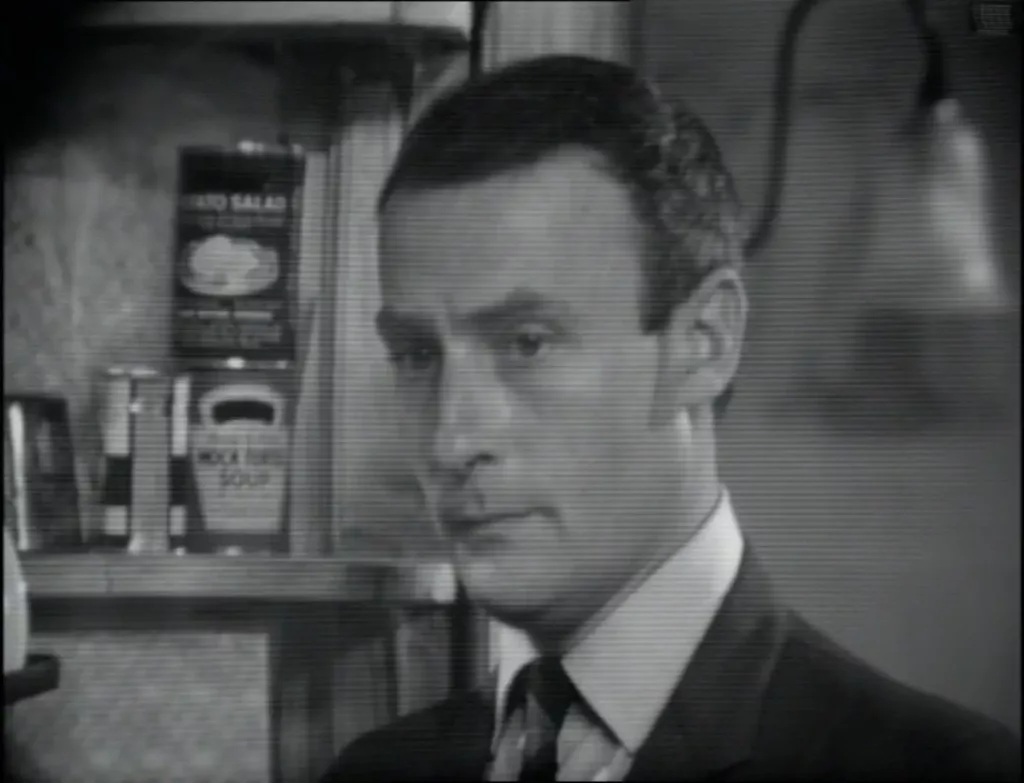
There’s a close-up of Callan in his flat next to a shelf with tins of potato salad and Heinz Mock Turtle Soup. My eye is always drawn to this soup. The Heinz name has been blacked out by the production team, but the shape of a Heinz tin label is unmistakable. It had been around for decades by 1967 and over 50 years later there is still brand power behind it. Turtle soup was a prestigious thing – it required a lot of prep and turtles were so tasty that they became rarer and rarer… Mock turtle soup solved the problem of cost and too-tasty extinction-risking real turtle soup.
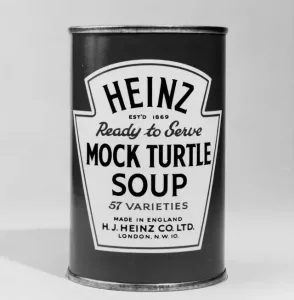
My eye was first drawn to the Heinz Mock Turtle Soup because I have never seen let alone tasted it. I go down a rabbit hole to discover that by the late 1960s tastes were changing and mock turtle is no longer that popular. It will disappear from shelves soon. But I continue thinking about the Mock Turtle Soup each time I watch this episode. Why does Callan have it? It is never needed for a scripted element of the programme. A production team wanted to make it look like someone lived here, so filled it with things. But how much thought was given to those things? Why does Callan have a tin of Mock Turtle Soup and not Cream of Tomato?
You should have got here sooner, Mr Callan
Poor Lonely gets beaten up twice in this episode. Meres visits Lonely to make sure he won’t talk about Pollock, the flat – anything, but uses it as an excuse to submit a second beating. He does seem nastily sadistic here.
When Callan finds Lonely we get some marvellous floaty flute-based music, with a touch of piano tinkling. It evokes a dream-like quality, which perfectly matches Lonely’s slightly out-of-it mumbling. The track is called ‘Darkness’ and, along with the rest of the story’s incidental music, was taken from De Wolfe’s Eye For An Eye album – the same one that provided Callan’s theme, ‘Girl in the Dark’.
Someone duffed up Lonely
Having already warned the Section off Lonely once, Callan calls Hunter – even though Lonely won’t say, he’s certain Meres was behind the second beating. Hunter is dismissive, telling him, “Lonely is a thief, Callan. It’s an occupational hazard.” (A phrase that always makes me think of the Porridge title sequence.) Callan isn’t having it though.
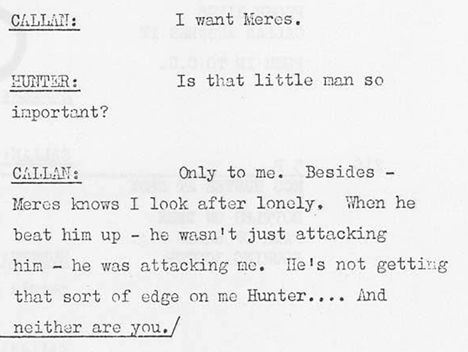
We see Callan’s almost paternal instincts to Lonely. They’re perhaps best described as brotherly ones: big brother can push him around but no one else can. Although Callan does add the aspect about Meres getting at him, it’s hard to be sure whether he’s just saving face with that or genuinely does care for Lonely. Is he saying it to cover himself in front of the Section, or because he doesn’t want to acknowledge that level of friendship to himself?
I think Callan likes being a loner in some ways – likes feeling in control and that he hasn’t got to rely on anyone else. But it’s early days still and we’ll go on to see how Callan and Lonely’s relationship develops as Lonely gets more involved in later series.
Little Orchard, Craythorpe, Sussex
Callan returns to the Lyalls, solely to screw things up for Toby. Callan has in fact simply guessed that Toby will be there with Pollock, which is much more credible than other elements of the story. He arrives in overalls and a flat cap this time, presumably so he can pass as a tradesman with an excuse to be wandering around this posh street – no role play required for this part sadly.
Callan’s involvement here doesn’t change anything: Pollock was never going to get away because it wasn’t really the Russians helping him; the formula – hidden in a ring of Sue’s – has disappeared after Mrs Lyall secretly pawned it; and the Section were always going to make sure Pollock ended up back inside.
The only impact Callan has on proceedings is to ensure Meres gets knocked out by Pollock (“I do wish it could have been me”) after a phone call reveals to Pollock who Meres really is. Callan then moves in to ensure Pollock doesn’t leg it. Hunter soon arrives and finds Meres lying, coffin-like, with his arms crossed on his chest, which is a lovely little touch – it’s just the sort of thing Callan would do to Toby!
Top rate
Ignorant of what was hidden in it, Mrs Lyall had replaced Sue’s ring with a glass-jewelled one. Hunter asks for Callan’s help in getting it back and… Callan accepts. This is the first time in the series that Callan has willingly agreed to taken on something for the Section, with Hunter blackmailing him previously. With Toby out of action and out of Hunter’s good books, he knows the strength of his position and demands “top rate”. It’s satisfying to see Callan get one over on the Section and feels like a fairly upbeat ending – no one has died and the cash will be going to Lonely.
This isn’t a strong story to end the series on. It has a series of coincidences that stretches our suspension of disbelief, showing that James Mitchell is running out of ways to drag Callan back in with Section business. The script even has to get him into Hunter’s office to read out Pollock’s file, so we can learn that Pollock’s former company were working on a new nerve gas and he ran off with the formula. Without this, we’re halfway through the episode and still haven’t a clue what the formula they’ve been referring to is actually for. We’ll do away with such ridiculous contrivances next series, thankfully, when we tend to get a more standard mission introduction.
But despite this, You Should Have Got Here Sooner is an episode that provides plenty for our regular characters. Delving into series 1’s missing episodes has shown how limited both Meres and Lonely’s parts are compared to later in Callan. In some ways, the surviving episodes are unrepresentative as they’re ones where both have reasonable contributions. However, even here, Lonely is really only there to pull Callan into the espionage plot. The only screentime Meres and Callan share is while Meres is unconscious, and while Meres has been in most episodes, he and Callan still haven’t interacted much. They share a single scene in both Goodbye Nobby Clarke and But He’s a Lord Mr Callan, and don’t actually interact at all in The Death of Robert E Lee.
The episodes we’re missing are mainly ones where Callan is more isolated and more obviously an outsider in regards to the Section. I really enjoyed seeing that side to the character. Next series we get to see Callan clash with the Section and Hunter far more, and that’s interesting in a whole different way…

